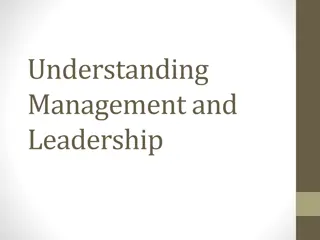Challenges in People Management and Leadership Quality Assessment
Developing effective people management skills is crucial in organizations, as highlighted by research findings showing low ratings for leadership quality and negative impacts on employees due to difficult managerial behaviors. Issues such as covering up mistakes, unapproachable bosses, and lack of decision-making opportunities contribute to stress and lost respect for managers. Emotionally intelligent managers play a key role in fostering positive social dynamics within organizations. The importance of self-regulation in emotional intelligence is emphasized for effective leadership. To enhance skills, completing questionnaires on people skills and leadership style is recommended.
Download Presentation

Please find below an Image/Link to download the presentation.
The content on the website is provided AS IS for your information and personal use only. It may not be sold, licensed, or shared on other websites without obtaining consent from the author. Download presentation by click this link. If you encounter any issues during the download, it is possible that the publisher has removed the file from their server.
E N D
Presentation Transcript
DR.S.ANGEL RAPHELLA ASSISTANT PROFESSOR DEPARTMENT OF BUSINESS ADMINISTRATION T.D.M.N.S. COLLEGE
THE CORE SKILLS OF EFFECTIVE PEOPLE MANAGEMENT
Developing People Management capacity is critical DDI and CIPD survey (2011) This new global leadership forecast reveals that only 36% of UK leaders and 18% of UK HR professionals rate the quality of leadership as 'high' in their organisations.
Chartered Management Institute Research 2011 10 per cent say they end up covering up mistakes that their manager has made The problems are impacting stress levels, with a third (34 per cent) saying their boss negatively impacts their enjoyment of their job and one in ten saying the issues have led to poor health.
Chartered Management Institute Research 2011 Many employees feel their bosses are unapproachable. in the past month nearly two thirds (61 per cent) have wanted to ask their boss for help making a decision, but have not been given the opportunity. As a result nearly one in four (23 per cent) people regularly worry about making decisions at work, one in three (32 per cent) say they have lost respect for their manager and
Emotionally Intelligent Managers People high in EI will build real social fabric within an organization and between an organization and those it serves, whereas those low in EI may tend to create problems for the organization through their individual behaviours Mayer, 2002
Self Regulation - a component of E.I. Video clip our emotional vs thinking brain
Task before next class Log onto Moodle Go to Section 4: Core Skills Click on How Good are your People Skills and complete the questionnaire Click on What is your leadership style and complete the questionnaire Bring the results to the next class and be prepared to discuss them in class
Review questionnaire results Work in pairs and review your results : 1. Did you learn something new? 2. Will you do things differently?/.....
Tesco Leadership Styles Case Study Summarise Tesco s Leadership and Management approach? What qualities does Tesco value in team leaders? What types of behaviours are associated with these qualities? What factors influence leadership styles ? 1. 2. 3. 4.
Real-life leaders: closing the knowing- doing gap, CIPD Report, September 2013 Recent leadership approaches suggest that one of the reasons for the lack of effectiveness of managerial training could be that development activities target the wrong leaders. There has been increasing recognition that all managers, including first-line supervisors, need at some level to be leaders to achieve performance targets through motivating and engaging individual employees. However, many organisations continue to view leadership as a function of the senior team, not attaching sufficient priority to developing the leadership skills of front-line managers or informal leaders in non-managerial roles
Real-life leaders: closing the knowing- doing gap, CIPD Report, September 2013 Evidence suggests that people management makes good business sense (Purcell et al 2003). At the same time, the survey findings reveal the perceived tension between achieving objectives and managing people: although 43% of employees in the survey agree that their manager balances the needs of the organisation with the needs of individual employees, only 39% of managers could say the same about their bosses. The public sector appears to be the best at managing the tension between people and task responsiblities. The survey showed that junior managers seem to be able to get ahead by raising employee engagement levels and developing staff 60% of line managers are evaluated on people management skills in their performance review
Project Tutorials Referring to the theory (remember to use a number of sources) covered in class develop Approx. 12 headings under which you will research the effective people management practices, skills and behaviours of your chosen leader Under each heading consider how you will source relevant and appropriate examples which will demonstrate this leaders level of skill in each are of competence In doing this consider Overall organisational approach to managing people Practices of effective people managers Behaviours of effective people managers Be prepared to discuss & justify your approach
Five things bosses say that they shouldnt !! Irish Independent, 2 October, 2013 Having encountered countless Miranda Priestly-style bosses in her time, Lydia Whitlock has just written a book about her start in LA. To My Future Assistant: Your Foolproof Guide to Handling the Boss from Hell is a light-hearted take on her experiences, and those of other assistants. It deals with bosses ridiculous requests, offered up in the form of promises to her future assistant, listing all the crazy behaviours she won t partake in when she becomes a boss. Challenge (n) Typically said in an enticing tone of voice; anything described as such is really just a tedious and difficult project in disguise. Internet, the (n) A blanket word used by bosses to describe anything to do with internet connectivity or even just basic technology, from email to YouTube. Let s . . . (v) The beginning of a sentence spoken by the boss who wants to tell you to do something but is too passive-aggressive to actually give you a direct order, and therefore starts everything with the incorrect suggestion that both of you will be performing the task. Political (adj) A word used to describe any situation that the boss is too lazy/scared to deal with. Thanks (n) A word used by bosses when they realise their assistants are almost at breaking point, in an attempt to make them feel appreciated for just a little bit longer, so as much work as possible can be sucked out of them before they re allowed to go home at























